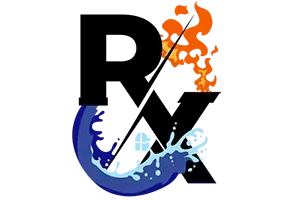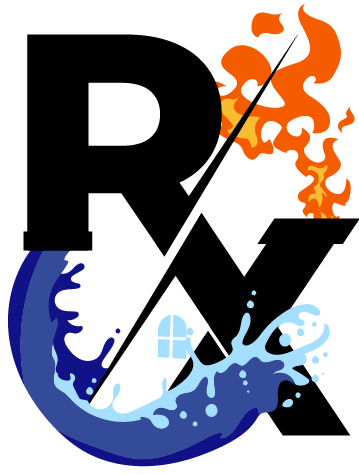Water
24/7/365 Emergency Service
IICRC Certified
Works With All Insurance Carriers
60-Minute On-Site Response Time
Free Estimates
Locally Owned & Operated
OR GIVE US A CALL 24/7
801-441-2919

Water Damage Restoration in Salt Lake City
Emergency Water Damage Repair & Restoration Services in Salt Lake City
Water damage can strike at any time, causing significant disruption and stress. Whether it's a burst pipe, a leaky roof, or a natural disaster, RX Restoration is here to help. We provide comprehensive water damage restoration services to residential and commercial clients in Salt Lake City and Utah County.
For all your restoration and clean-up needs in Salt Lake City and the surrounding areas, contact us today at 801-441-2919 or fill out the form on our
contact page.
What To Do When Water Damage Happens?
Experiencing water damage can be highly stressful, especially during emergencies. Here's what you should do in the event of water damage:
Water Extraction: Rapid removal of standing water using powerful pumps and vacuums to minimize damage to your property and belongings.
Flood Damage Cleanup: Comprehensive restoration services for properties affected by flooding, including water removal, debris cleanup, structural drying, and sanitization.
Sewage Cleanup: Safe and effective removal and disposal of sewage water, followed by thorough disinfection to eliminate health hazards.
Water Mitigation: Proactive measures to prevent further damage, including securing the property, removing damaged materials, and controlling humidity.
Leak Detection: Advanced technology to pinpoint the source of leaks, even hidden ones, allowing for efficient repairs and preventing future damage.
Thermal Inspection: Infrared cameras to identify moisture trapped within walls and ceilings, ensuring complete drying and preventing mold growth.
Dehumidification: Industrial-grade dehumidifiers to remove excess moisture from the air, accelerating the drying process and preventing mold and mildew.
Structural Drying: Specialized techniques to dry out building materials like walls, floors, and ceilings, preventing warping, cracking, and other structural issues.
Why Choose RX Restoration
24/7 Emergency Service: We're available around the clock to respond to your water damage emergencies, minimizing damage and disruption.
IICRC Certified: Our technicians are highly trained and certified by the IICRC, ensuring the highest standards of service and expertise.
Fast Response Time: We arrive on-site within 60 minutes, ready to begin the restoration process immediately.
Locally Owned and Operated: We're a local business committed to serving our community with personalized care and attention.
We Work with All Insurance Carriers: We handle the paperwork and communication with your insurer, making the claims process as smooth as possible.
Our Water Damage Cleanup & Remediation Process
Our process entails a comprehensive approach:
Assessment and Inspection: Our experts assess the water damage to determine the necessary actions.
Water Extraction: We swiftly remove standing water using specialized equipment.
Drying and Dehumidification: Our high-capacity fans and dehumidifiers thoroughly dry the affected area.
Cleaning and Sanitizing: We clean and disinfect surfaces for a safe and hygienic environment.
Repairs and Restoration: Our skilled technicians repair structural damage and restore your property to its pre-damage condition.
Final Inspection: We conduct a final check to ensure the area is safe for occupancy.
Documentation and Communication: We provide thorough documentation for insurance purposes and maintain clear communication with you and your insurance provider.
What Are The Different Types of Water Damage?
Experiencing water damage can be highly stressful, especially during emergencies. Here's what you should do in the event of water damage:
Step 1: Identify the Source and Shut off the Water Supply
If your property is undergoing active flooding, it's advisable to immediately turn off your main water supply to prevent escalated flooding. However, ensure you can safely reach your main water line before attempting this.
Step 2: Disconnect the Power Supply
To ensure safety during a flood, we recommend switching off your power to prevent potential electrocution risks. Even a minor leak, not exposed to any electrical wiring, could swiftly escalate into a major water damage situation. That's why RX Restoration advocates for the precaution of switching off your electricity.
Step 3: Contact a Reliable Water Damage Restoration Service
Your next crucial step should be calling a trustworthy water damage restoration service like RX Restoration. Available 24/7 for water damage cleanup emergencies, our team identifies the source, halts it, extracts any standing water, removes contents, and initiates the drying process to prevent further damage or mold growth. We also work closely with your insurance company, supplying them with all the necessary data and documentation required to ensure your claim is maximized.Category 3: Black Water: Black water is highly contaminated and poses significant health risks to humans and animals. It contains pathogenic, toxic, or other harmful agents and can cause severe illnesses or even death if ingested or exposed to the skin. Category 3 water damage typically comes from sewage backups, flooding from rivers or streams, toilet overflows with fecal matter, or standing water that has developed bacteria and mold. Cleanup and restoration of Category 3 water damage require specialized training and equipment.
Step 4: Safeguard Your Valuables (If Safe to Do So)
If the situation allows, try to remove any easily portable valuables from the affected area. However, if there's a possibility of electrified water or if sewage is present, we strongly discourage attempting to retrieve any items for your own safety.
What Are The Different Types of Water Damage?
Water damage comes in three forms, each with varying levels of risk and implications for the cleanup process. Some types carry viruses and bacteria, posing serious health risks. The IICRC, an internationally renowned body for the inspection, cleaning, and restoration industries, identifies these distinct types:
Category 1: Clean or "Sanitary" Water Damage
This category involves water that originates from a clean and sanitary source. It poses no substantial risk to human health if consumed or touched. Common sources include broken water supply lines, overflowing sinks or bathtubs, or rainwater. However, if left untreated, Category 1 water can escalate to Category 2 or 3 if it comes into contact with contaminants.
Category 2: Grey Water
Grey water contains a moderate level of contamination and may cause discomfort or illness if ingested or exposed to the skin. Sources of Category 2 water damage include discharge from appliances like washing machines or dishwashers, sump pump failures, or water from minor toilet overflows (with no fecal matter). Proper handling and cleanup are essential to prevent health risks.
Category 3: Black Water
Black water is highly contaminated and poses significant health risks to humans and animals. It contains pathogenic, toxic, or other harmful agents and can cause severe illnesses or even death if ingested or exposed to the skin. Category 3 water damage typically comes from sewage backups, flooding from rivers or streams, toilet overflows with fecal matter, or standing water that has developed bacteria and mold. Cleanup and restoration of Category 3 water damage require specialized training and equipment.
Does Homeowners Insurance Cover Water Damage?
Understanding your homeowner's insurance coverage for water damage is crucial in handling such emergencies. Many wonder, does homeowners insurance cover water damage? The answer depends on the source and nature of the damage.
When it comes to homeowner's insurance coverage for water damage, certain situations are usually covered:
Sudden and Unexpected Events: These are incidents that occur without warning. Examples include a burst pipe or a malfunctioning appliance.
Damage from Storms: Damage caused by unpredictable weather events like wind, hail, lightning, or frozen plumbing is typically covered as they are beyond a homeowner's control.
Vandalism: If an individual intentionally floods your property, the water damage resulting from this malicious act is generally covered.
Fire Extinguishing Efforts: If water damage occurs as a result of efforts to extinguish a fire in your home, it's typically covered.
However, there are certain circumstances where the homeowner's insurance may not cover water damage:
Neglect or Poor Maintenance: Damages resulting from a lack of maintenance, such as ignoring a known leak, are unlikely to be covered.
Floods: Natural disasters such as floods from overflowing rivers, heavy rain, or storm surges are not covered by standard homeowner's insurance. You would need a separate flood insurance policy for these occurrences.
Sewer Backups: If water or sewage backs up through sewers or drains, coverage isn't usually provided under standard homeowners insurance unless you have a specific endorsement or additional policy for it.
Ground Seepage: Water that seeps into your home from the ground typically isn't covered.
It's important to thoroughly review your homeowner's insurance policy to understand what types of water damage are covered and which ones require additional coverage.
For all your restoration and clean-up needs in Salt Lake City and the surrounding areas, contact us today at 801-441-2919
or fill out the form on our
contact page.
-
Do you work with my insurance?
Yes, we work with all major insurance carriers. We handle the paperwork and communication with your insurer, making the claims process as smooth as possible.
-
How long will the water damage restoration process take?
The duration depends on the extent of the damage, but we strive to complete most projects within 2-5 days. We'll provide a detailed timeline after assessing your specific situation.
-
How much does water damage repair cost?
The cost varies depending on the type and extent of the damage. We offer free estimates and transparent pricing, so you'll know exactly what to expect.
-
What are the most common causes of water damage?
Common causes include burst pipes, appliance malfunctions, leaky roofs, overflowing toilets, and natural disasters like floods and storms.
Schedule an Appointment 24/7
Contact us today at 801-441-2919 for all your restoration and clean-up needs in Salt Lake City, and the surrounding areas.
Contact Us
We will get back to you as soon as possible.
Please try again later.
**by clicking SUBMIT you consent to receiving SMS messages. Messages and Data rates may apply. Message frequency will vary. Reply Help to get more assistance. Reply Stop to Opt-out of messaging**
Our Services
There Are Plenty of Water Damage Restoration Companies in the Salt Lake City Area
So Why Choose RX Restoration?
Are you having a restoration issue in Salt Lake City or Utah County? Rx Restoration is the leading full-service restoration contractor. Our team of dedicated professionals is ready to assist you with any restoration needs you may have. Whether it is a small residential job or a large-scale commercial job, our IICRC-certified technicians are ready, 24/7, to get your property back to normal.
Schedule an Appointment 24/7
Don't let water damage ruin your property. Contact RX Restoration today for a free estimate and let our experts restore your home or business to its pre-damage condition.
Contact Us
We will get back to you as soon as possible.
Please try again later.
Serving ALL OF SALT LAKE CITY AND Utah County
Rx Restoration services the entire Utah County & Salt Lake City area. We can be out to your property within 60 minutes for emergency response. Checkout some of the areas we commonly work in!
DON'T SEE YOUR SERVICE AREA? No problem! WE SERVICE ALL OF UTAH COUNTY & SALT LAKE CITY. GIVE US A CALL OR COMPLETE THE FORM ON OUR CONTACT PAGE AND WE'LL LET YOU KNOW WHEN WE CAN MAKE IT OUT TO YOU!
Rx Restoration
Providing comprehensive restoration services in Salt Lake City and Utah County, our expertise spans water damage, fire damage, mold remediation, and more. Our prompt response, industry accolades, and close collaboration with insurance companies exemplify our commitment to quality service and client satisfaction. Trust us to restore your property efficiently and effectively, ensuring you a safe and habitable environment.
IICRC Certified
OUR SERVICES
Contact Information
Rx Restoration
1194 E 1060 N, Spanish Fork, UT 84660
801-441-2919
office@rxrestoration.com
Rx Restoration
801-441-2919
1404 W State St Suite 208, Pleasant Grove, UT 84062

